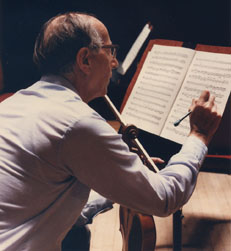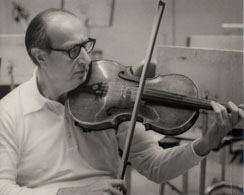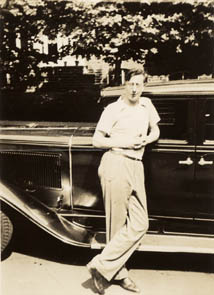Irving J. Segall 1921-2004
Thirty-One Season Philadelphia Orchestra Member,
Classical Music Business Labor Activist
by Ira Norman Segall
page two of three
It was during that time - as player rights, salaries and other demands became issues - that he and a small group of determined activists laid groundbreaking work for what would become a national movement acknowledging the identity of the symphony player on stage as ‘labor’ and of the orchestras themselves and ‘management,’ in order to address these concerns.
Irving J. Segall 1921-2004
Thirty-One Season Philadelphia Orchestra Member,
Classical Music Business Labor Activist
by Ira Norman Segall
page two of three
Irving was a founding member and eventually become chairperson of The International Conference of Symphony and Opera Musicians (ICSOM). The musicians felt that the union at that time was not paying needed attention to the classical player and that they deserved a voice of their own. However, the union, The American Federation of Musicians, thought that what this group was launching was a separate union; ICSOM’s first two years have thus been characterized as "....dangerous times for all of us.”
He and a small group were single-handedly responsible for the rights and salaries of the players on the stages of every major orchestra today. This has earned him more respect and admiration than his musical accomplishments. This otherwise not outgoing man stood up and did truly extraordinary work to organize and shape change for an entire industry. He also sat on the U.S. Government’s National Endowment for the Arts.
Men who came to the bargaining table pounding fists, ready to plunge political knives into the backs of their opponents, were met by Irv’s love for people and his compassionate nature - and they were calmed. They truly felt that they had been listened to and heard. He built bridges and lasting relationships - he made friends of everyone he met. Irv was devoted to justice. He had a very strong sense of what was "the right thing to do."
When he died, his family received phone calls from members of orchestras all around the world - from Europe, from the Middle East, from Asia. At his funeral service, members of The Philadelphia Orchestra played string quartets in his honor. Many stood and shared stories of playing music with him, of fearing him from across the negotiating table and of calling him friend.
Truly outstanding people like Irving Segall reach out from deep in their hearts and accomplish what needs to be accomplished with love and compassion - the accomplishments become even more monumental because of the love.
| 

